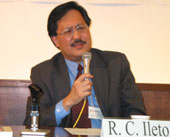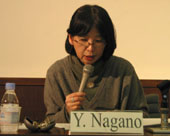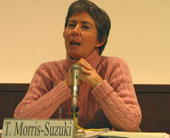

An account of history and nation-building on the Philippines would not be in line with the presentation I gave last year, so for my presentation this year I decided to continue from the presentation I gave last year. In 1988, I published a critique of Philippine nationalist historiography that highlighted its progressivist, Enlightenment lineage, its linear construction, and the exclusions that invariably accompanied such an emplotment. Echoing Foucault, I called for the resurrection of suppressed knowledge and the writing of history that resists incorporation into the nation-statefs grand narrative. I was very interested in the grand narratives in the 1980s in the Philippines.
In my paper for last yearfs workshop, I returned to one of the texts I scrutinized in my 1988 essay and began to interrogate my previous conclusions about the repressiveness of nationalist history. The text in question was Teodoro Agoncillofs A Short history of the Filipino People, a typical nationalist work in which the past is harnessed to the building of the nation-state. In critiquing nationalist historiography in the early- to mid-1980s?and in celebrating the contingent, the local, and the nonlinear?I was writing against the ideological underpinnings of the Marcos state, whose history textbooks bore the same structural features as Agoncillofs.
Last year, I began to trace the genealogy of my engagement with nationalist historiography and its alternatives. I began with my Cornell mentor Oliver Woltersf warning in 1967 that I should not write a history book like Agoncillofs. I tried to show that nationalist historiography and discourse, or at least its Philippine articulation, has been much more complex than we have taken it to be. I also revisited the alternative that was being pushed at that time, and which still holds currency today?hautonomous historyh as articulated by John Smail in the early 1960s.
My statements about Filipino domestic or gnationalisth historiography cannot be separated from my multiple positioning as a gtraveling scholar.h In this essay, I retrieve three unpublished texts I wrote at various stages of my career. The first was written in 1986, as I was preparing to leave the University of the Philippines after having taught there since 1977. The second text I examine was written for a historiography workshop in Canberra in early 1991. The third and last text was written towards the end of 1994 after I had interviewed a number of historians from Southeast Asia and organized them into a colloquium for the IAHA convention in Tokyo earlier that year.
During my time at the James Cook University, Queensland, the pride and joy of the James Cook University history department, Queensland was a glass-paned, polished wood cabinet filled with over a hundred honors and post graduate theses, bound in black with bold gold lettering. The cabinet occupied a privileged space because it was meant to signify a successful, productive, flourishing history department, however it was the case that the University history department was singularly characterized by this thesis cabinet and its contents. .
A colloquium on gIndigenous Southeast Asian Historiographyh for the 13th conference of the IAHA (the International Association of Historians of Asia) was held in Tokyo in September 1994. At that time there was discussions of nationalist historiography, and I was able understand how historical writing gets to be practiced in different context in Southeast Asia.
What are the implications of the three short essays that wrote? Through revisiting my three earlier essays, some idea of gcontexth can be gleaned. I can see how my interactions with historians in Australia and Southeast Asia altered my views about Filipino historiography, and helped set my research agenda for the late 1990s.
Although I have not specifically brought this matter up in this essay, I want to stress that debates on national history were set not just within domestic concerns but also against a backdrop of American imperialism and its various forms of hegemony. After all, the Philippines was conquered in 1901 and colonized for nearly half a decade by the United States. Much of Filipino nationalist history in the 1950s and 60s was part of a broad, decolonizing effort.
Relating Filipino nationalist historiography to our post-September 11 concerns about the activities of the U.S. global hegemon, when American military forces returned to the Philippines in the early months of 2002 to help their local allies pursue the gwar against terror,h not many Filipinos realized that history was repeating itself. Most are familiar with the story of the gbirth of the nation,h celebrated in a massive way during the centennial of the Revolution that reached its climax in the Grand Parade of June 12, 1998. With threats of war hovering over the world at large since September 11, 2001, the events that radical nationalist historians have being castigated for dwelling too much on the Revolution of 1896-98 and the Filipino-American war of 1899-1902, which take on a significance that we have not seen since the late 1960s when the Philippines was referred to as the gfirst Vietnam.h Given the incredible gWar on Terrorh that has begun to fill the vacuum of the gCold War,h it is important to understand what really took place in the gCold Warh of the 1950s to 1970s when historians, in the Philippines at least, wrote in the shadow of the American empire. With this empire now practically unchallenged globally, perhaps the Filipino experience can serve as a useful example to others.

During the 1990s we witnessed the rising importance of multiculturalism. After the September 11th 2001, the US has extended its influence, and US ascendancy in the cultural sphere has also extended. Or, to say more properly, our views on the post-Cold War era has traumatically changed after the September 11th attacks.
It is important for us today to examine how historical narrative is changing in an ear of globalization. Based on my understanding on the significance of collective memory in a gglobalizedh society, this paper will argue the meaning of a recent debate on the Philippine Revolution as one of the most striking examples as a hegemonic war between American and Filipino scholarships in Philippine historiography.
Glenn Mayfs book entitled: Inventing a Hero: The Posthumous Re-Creation of Andres Bonifacio is the most controversial book in Philippine historiography throughout the past decade. Because May aimed not only the total negation of the interpretation of the Philippine Revolution that have been reconstructed by Filipino scholars since Agoncillofs The Revolt of the Masses but the previous writings by Filipino contemporaries or writers on the Revolution.
When I read Mayfs Inventing a Hero in April-May 1998, my major interest was to find out the genuine motive of Glenn May who wrote his book. What I found after its careful reading including all the sentences in endnotes is that Mayfs genuine motive is the total overthrow of the image of the Philippine Revolution that has been constructed by Filipino scholars, by way of contesting the authenticity of historical materials or interviews that they used to prove the Bonifaciofs role in the Philippine Revolution. If we read Mayfs book carefully, we might notice that May follows the trajectory of the Philippine Revolution, focusing on Bonifaciofs life and his role.
By reading Inventing a Hero in this way, we might get Glenn Mayfs view on the Philippine Revolution. His image of the Revolution is that the revolutionary forces or its government were organized and controlled under the leadership of local elites throughout the course of the revolution. It is extremely important to note here that Mayfs view on the Philippine Revolution might be interpreted exactly the same as the old image on the Revolution, not only before Iletofs Pasyon and Revolution, but also even before Agoncillofs The Revolt of the Masses.
Glenn Mayfs attack against Filipino scholarship on the Philippine Revolution gave a tremendous shock to Filipino historians and they repeated criticism or rebuffs as previously mentioned. Among them, it was Reynaldo Ileto who took a firm stand against May and has seen that Mayfs genuine intention does not lie in the criticism of the weakness of scrutiny of historical sources, but in the total negation of the interpretation of the Philippine Revolution that have been reconstructed by Filipino scholars since Agoncillofs The Revolt of the Masses. The confrontation between Glenn May and Reynaldo Ileto did not last long: first by Iletofs perfect refutation against May, and second, by Mayfs abandoning his scholarship on Philippine history.
In the Introduction of Inventing a Hero, Glenn May gives a detailed explanation why he came to write his book. He says that at the beginning he never thought of writing this kind of book. In 1989 he launched his research project on the Philippine Revolution, seeing that the centennial of the Revolution was approaching. By and by his interest was focused on Andres Bonifacio and he started his preparation to write a book on Bonifacio from his own viewpoint. However, he found that his attempt should not materialize due to the lack of historical materials at hand. Instead, he decided to write a book on the questions of the authenticity of historical materials that have been widely used in the studies on the Philippine Revolution.
Mayfs probable assumption that Filipino historians could not perceive his gtraph discloses itself his way of thinking that he as American scholar should stand on an superior position to the Filipino historians in Philippine studies. It seems to be particularly so to Reynaldo Ileto whom Glenn May attacks most severely and even sarcastically. Ileto however, easily deciphered Mayfs gtraph and counterattacked against the overall criticism on the Philippine historiography that had been constructed since independence. Ileto even took a further step: he initiated the deconstruction of American colonial discourse that had bound Filipinofs mode of consciousness for a long time. Echoing Iletofs new direction of Philippine historiography, the relatively young generation of Filipinos as well as Filipino-American scholars is coming up in the fields of history, politics and comparative culture that might bring us dynamic contributions to the Philippine studies in the first decade of the 21st century.

Prof. Morris-Suzuki stated that prior to her first visit to the Philippines she had visited Japan and had noticed the difference in nationalism from country to country. Nationalism is an enormously complex thing, in all contexts. For that reason, it is important to think carefully about the critique of nationalist history. The critique of nationalism is not necessarily complicit with globalization any more than nationalism is a move against globalization.
Prof. Morris-Suzuki highlighted the comment by Prof. Ileto about his experience at a small university in Australia, and suggested that the problem was rather than a lack of theory, it was how the theory was being used.
Concerning the question of US hegemony and neo-colonialism, Prof. Morris-Suzuki likened the papers to the situation in Japan currently, where there is a resurgence of negative feeling towards the United States. She suggested that while a critique of US hegemony was important, it was important to conduct it through dialogue among academics and leave room for the voices of immigrants and diasporas throughout the world. It is also important to cross the boundaries between academia and other areas of society.
Prof. Fujiwara thanked the speakers for focusing debate on what is a hot topic in the Philippines. He questioned whether Glenn Mayfs book was really an example of US hegemony of historiography, suggesting that Mayfs work was rather a retreat from US hegemony. He suggested that the question was one of persons studying the history of the Philippines who are not Filipino.
Prof. Ileto responded with a comment about Glenn May. He stated that the problem with the work by May was a lack of self-reflection, pointing out a gap between colonial and post-colonial scholarship. He urged that scholars should remember their forebears in historical writing, and there were links with writing in the present and several decades previously.
Prof. Nagano responded that she had the opportunity to meet with Glenn May on several occasions, and was very interested in his book. She had the impression that he is an American with some cultural ascendancy issues.
Prof. Ileto stated that some things that appeared in US history in the past are not covered in contemporary discussion. He expressed concern at these selective amnesiac tendencies of US scholars.
Prof. Abinales suggested that the tension was no longer with the US, but may have something to do with Filipinos and their ideas of democracy. He asked Prof. Nagano what her idea of a typical American was and commented on the war background of many Filipinists.
In response, Prof. Ileto stated that a creative rewriting of history in the 1950s had become dogma by the time of the 1970s. In addition, concerning Americans, Prof. Ileto expressed interest that the likes of Glenn May could be against the Viet Nam war and Japanese aggression and yet not be greatly opposed to the Philippine war.
Prof. Nagano responded that she did have some anti-US feeling, stemming from the time of the Korean War, but that US influence in Japan remains strong. She stated people of a later generation may harbor different feelings.
Prof. Fujiwara suggested that Glenn May was the person who everybody loves to hate, but suggested that his example should not be so surprising.
Prof. Ileto responded to a question from Mr. Hokari, recommending that he look at the book of a colleague.
Prof. Takenaka referred to national heros and religious leaders, asking how they should be viewed.
Prof. Ileto responded that the Philippine and Indian case were very different. He suggested that the original event of the nation state in the Philippines was the revolution.
Prof. Sarkar referred to the military activism of the US.